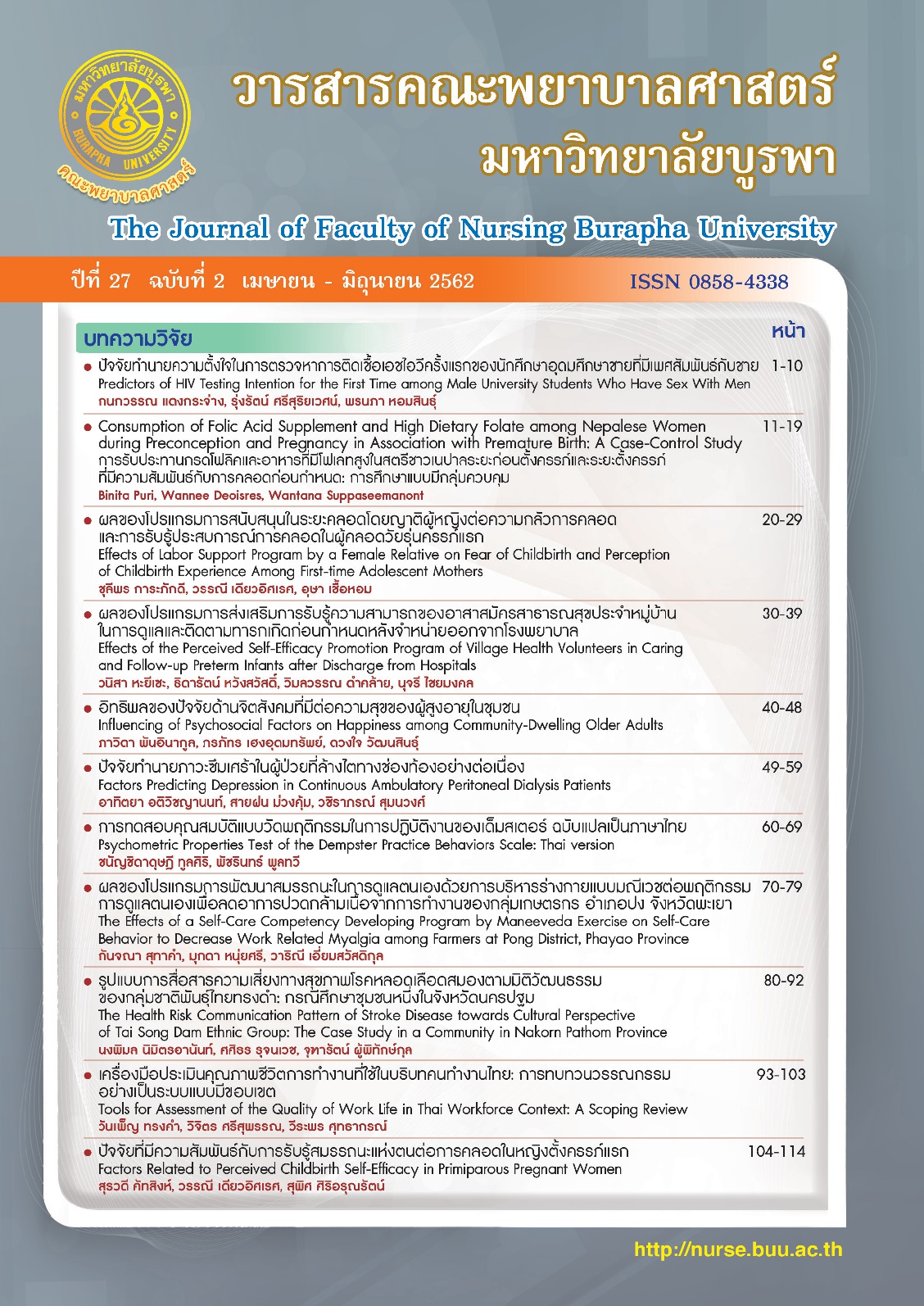อิทธิพลของปัจจัยด้านจิตสังคมที่มีต่อความสุขของผู้สูงอายุในชุมชน
คำสำคัญ:
ความสุข, ผู้สูงอายุในชุมชน, การมองโลกในแง่ดี, พลังสุขภาพจิตบทคัดย่อ
บทคัดย่อ
การวิจัยแบบหาความสัมพันธ์เชิงทำนายนี้มีวัตถุประสงค์เพื่อศึกษาความสุขและปัจจัยที่มีอิทธิพลต่อความสุขของผู้สูงอายุในชุมชน คัดเลือกกลุ่มตัวอย่างด้วยวิธีการสุ่มอย่างง่ายจำนวน 107 คน เป็นผู้สูงอายุที่อยู่ในชุมชนเขตตำบลปลวกแดง จังหวัดระยอง เครื่องมือที่ใช้ในการวิจัย ได้แก่ แบบบันทึกข้อมูลส่วนบุคคล แบบวัดความสุข แบบวัดการรับรู้ความสามารถของตน แบบวัดการมองโลกในแง่ดี แบบวัดพลังสุขภาพจิต และแบบวัดสัมพันธภาพในครอบครัว มีค่าความเชื่อมั่นเท่ากับ .81, .80, .70, .80 และ .82 ตามลำดับ วิเคราะห์ข้อมูลด้วยสถิติพรรณนา ค่าสัมประสิทธิ์สหสัมพันธ์ของเพียร์สัน และการวิเคราะห์ถดถอยพหุคูณแบบขั้นตอน
ผลการศึกษาพบว่า กลุ่มตัวอย่างมีความสุขอยู่ในระดับสูง (M = 4.72, SD = 18) การมองโลกในแง่ดีและพลังสุขภาพจิตสามารถร่วมทำนายความสุขของผู้สูงอายุได้ร้อยละ 18.6 ปัจจัยที่มีอิทธิพลมากที่สุด ได้แก่ การมองโลกในแง่ดี (b = .728, p < .001) และรองลงมาคือพลังสุขภาพจิต (b = .202, p < .01) การรับรู้ความสามารถของตนและสัมพันธภาพในครอบครัวไม่สามารถทำนายความสุขได้ (p > .05) ผลการศึกษาในครั้งนี้สามารถใช้เป็นข้อมูลพื้นฐานสำหรับบุคลากรทางการแพทย์รวมทั้งพยาบาลในการวางแผนหรือออกแบบโปรแกรมเพื่อส่งเสริมความสุขของผู้สูงอายุ โดยเน้นการส่งเสริมการมองโลกในแง่ดี และพลังสุขภาพจิตของผู้สูงอายุเหล่านี้
เอกสารอ้างอิง
Achat, H., Kawachi, I., Spiro, A., Demolles, D. A., & Sparrow, D. (2000). Optimism and
depression as predictors of physical and mental health functioning:
The normative aging study. Annals of Behavior Medicine, 22, 127-130.
Argyle, M., & Martin, M. (1991). The psychological causes of happiness. In F. Strack, M.
Argyle & N. Schwarz (Eds.), Subjective Well-being an Interdisciplinary
Perspective (pp. 77-100). Oxford: Pergamon.
Boonroungrut ,C. (2009).The spiritual well-being and happiness in the elderly at
Ban Bangkhae social welfare development center. Master thesis, Psychiatry, Chulalongkorn University. [In Thai]
Chansukitmathee, S. (1997). Quality of life in the elderly with benign prostatic
hyperplasia. Master thesis, Adult nursing, Graduate school, Mahidol
University. [In Thai]
Diener, E., Suh, E. M., Lucas, R. E., & Smith, H. L. (1999). Subjective well-being: Three
decades of progress. Psychological Bulletin, 125, 276-302.
Harabut, P. (2008). Factors influencing health-promoting behaviors of elderly people
in Khockjaroen District, Lopburi Province. Master Thesis, Family Nursing,
Faculty of Nursing, Burapha University. [In Thai]
Hengudomsub, P., Kangchai, W., & Pathumarak, N. (2011). Physical and mental health
relationships in community-dwelling older adults, The Journal of Nursing,
Burapha University, 19 (Suppl 2), 107-118. [In Thai]
Karademas, E. C. (2007). Positive and negative aspects of well-being: Common and
specific predictors. Personality and Individual Differences, 43(2), 277-287.
Kulprasutidilok, A., Jirawongnusorn, S., Chitmanasak, N., & Supawantanakul, D.
(2014). Path analysis of factors affecting quality of life in the elderly in Bang
Khen district, Bangkok. Journal of Health Science Research, 2, 35-46. [In Thai]
Leung, C. (2005). Convivial communication: Recontextualizing communicative
competence. International Journal of Applied Linguistics, 15(2), 119-144.
MacLeod, S., Musich, S., Hawkins, K., Alsgaard, K., & Wicker, E. (2016). The impact of
resilience among older adults. Geriatric Nursing, 37, 266-272.
Namarak, R. (2015). Family factors influencing exercise and eating behavior among
elderly with overweight in Muang District, Nakhonprathom. Master thesis,
Family Nurse Practitioner, Faculty of Nursing, Burapha University. [In Thai]
National Statistical Office of Thailand. (2014). The survey of Thai older population
in the year 2014. National Statistical Office of Thailand: Bangkok. [In Thai]
Phathong ,W. (2004). Effects of an optimism development program on happiness of
hypertensive patients. Master thesis, Counseling Psychology, Graduate
School, Chiang Mai University. [In Thai]
Praparpak, W., & Choowatanapakorn, T. (2012). Resilience, social support, coping and
quality of life of older persons with stroke. Journal of Police Nurse, 4(2),
71-81.
Rukchat, S. (2005). The self-health care practices and quality of life of the elderly in
Chaingmai. Master thesis, Arts (Community Research and Development),
Rajabhat Institute Chiang Mai. [In Thai]
Scheier, M. F., Carver, C. S., & Bridges, M. W. (1994). Distinguishing optimism from
neuroticism (and trait anxiety, self-mastery, and self-esteem): A re-evaluation of
the Life Orientation Test. Journal of Personality and Social Psychology, 67,
1063-1078.
Sukmak ,W., Sirisoonthorn, A., & Meena, P. (2002). Validity of the general self-efficacy
scale. Journal of the Psychiatric Association of Thailand, 47(1), 31-37.
Suksawat, B. Hengudomsub, P., & Nabkasorn, C. (2017). The effects of group cognitive
behavioral modification program on hope and depression among
community-dwelling older adults. The Journal of Faculty of Nursing,
Burapha University, 25(1), 95-107. [In Thai]
Thumcharoen, W. (2012). The influence of external and internal factors on happiness
of the elderly. Master Thesis, Applied Statistics, National Institute of
Development Administration.
Vapattanawong, P., Hogan, M. C., Hanvoravongchai, P., Gakidou, E., Vos, T.,
Lopez, A. D., & Lim, S. S. (2007). Reductions in child mortality levels and
In equalities in Thailand: Analysis of two censuses. Lancet, 10(369), 850-
855.
Wagnlid, G. M., & Young, H. M. (1993). Development and psychometric evaluation of
the resilience scale. Journal of Nursing Measurement, 1, 165-178.





